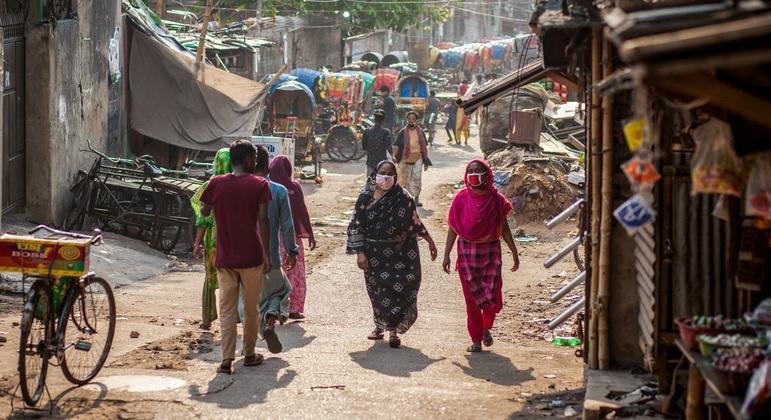The study gives the example of Dhaka, Bangladesh, where under a scenario of very high emissions by 2100, additional deaths due to climate change could rise to nearly twice the country’s current annual death rate from all cancers, and 10 times its annual road traffic fatalities.
“Because of human action, the concentration of carbon dioxide in our atmosphere is reaching dangerous levels, driving Earth’s temperatures higher and amplifying the frequency of intensity of extreme events”, says the newly launched Human Climate Horizons platform, adding that without concerted and urgent action, climate change will further exacerbate inequalities, and uneven development.
Mortality impacts
Building on the analyses of 2020, 2021 and 2022 Human Development Reports – and fed by an evolving stream of frontier research – the data shows how climate change can impact people’s lives – from mortality to livelihoods, and energy use.
Although higher temperatures and a warmer climate put cardiovascular and respiratory systems under stress everywhere, outcomes will vary between places, according to communities that have the resources to adapt and those that do not.
The data shows that climate change could increase mortality rates in Faisalabad, Pakistan by near 67 deaths per 100,000 population – causing more fatalities than strokes, the country’s third leading cause of death.
In Riyadh, Saudi Arabia, however, higher incomes could keep the death toll to 35 per 100,000, which is still deadlier than Alzheimer’s disease – the sixth leading cause of death globally.
Rising temps
Since the late 19th century, the earth’s average temperature has risen by nearly 1.2°C, changing the entire surface area of the planet, according to the research.
However, billions live in regions that have already experienced warming greater than the global average.
As an example, the platform pointed to Maracaibo, Venezuela, noting that in the 1990s it averaged 62 annual days with temperatures exceeding 35°C. However, by mid-century, that number will likely soar to 201 days.
Energy impacts
Electricity availability and fuels used to generate it to power air conditioners and heaters, play a crucial role in our ability to cope with extreme temperatures, said UNDP.
The impact of climate change differs across sectors of the economy – Human Climate Horizons
Yet, the impacts of climate change on energy use will vary locally, as individuals, communities and businesses adapt to conditions using available resources.
In Jakarta, for example, electricity consumption in response to warmer temperatures is projected to increase by roughly one-third of current household consumption in Indonesia. This will require critical additional infrastructure planning.
Labour impacts
More frequent and severe temperature extremes also impact livelihoods, affecting the ability to perform tasks and influencing work intensity and duration.
“The impact of climate change differs across sectors of the economy with workers in high-risk, weather-exposed industries like agriculture, construction, mining and manufacturing most affected”, according to platform data.
In Niamey, Niger, in sectors such as construction, mining and manufacturing, excessive heat was responsible for 36 fewer working hours annually, taking a 2.5 per cent toll on the country’s future GDP.

In Niger, as in many other parts of the Sahel, climate shocks have resulted in recurring droughts with devastating impacts on the region’s already vulnerable populations.
Human consequences
As the impacts of climate change are not evenly distributed globally, they will generate a significant uptick in inequalities over the coming years and decades.
But by highlighting that the future is not predetermined, UNDP hopes the information can empower people everywhere, to step up climate action.
The Human Climate Horizons mission is to ensure equal access to data on future impacts, inform decision-making and help everyone understand the human consequences of climate change in different scenarios.
‘Logical economic choice’
Meanwhile, UNDP has also launched the How Just Transition Can Deliver the Paris Agreement report this week, highlighting the need to embrace the “green revolution” – or risk increasing social inequality, civil unrest, economic loss.
Ahead of the UN climate conference, COP27, which kicks off on Sunday in in Sharm el-Sheikh, Egypt, the report spotlights the importance of “fair and equitable” transitioning to meeting the climate goals set out in the Paris Agreement.
From providing workers with new green economy skills and access to social protection to ensuring that countries lay out a clear pathway to a net-zero future, UNDP chief Achim Steiner said the report provides “real-world insights into how to accelerate momentum around a just transition that is fair and equitable for the energy sector and beyond”.

A family sit under a makeshift shelter in Sindh Province in Pakistan, after their home was damaged in the devastating floods.
A just transition
The report analyses both enhanced short-term climate pledges, known as Nationally Determined Contributions (NDCs), and long-term strategies in which countries lay out plans to cut greenhouse gas emissions to net zero.
Encouragingly, 72 per cent of nations with enhanced NDCs that refer to a just transition are linking them to socio-economic considerations, while 66 per cent are proposing concrete actions and measures factoring in climate justice.
However, they fail to make linkages to the Sustainable Development Goals (SDGs) or gender equality in either short or long-term climate plans – missing a significant opportunity, UNDP said.
“As climate change intensifies and the world faces an immense energy crunch…decoupling from fossil fuels and investing in the green energy infrastructure of tomorrow…[is] the only logical economic choice”, said Mr. Steiner.



